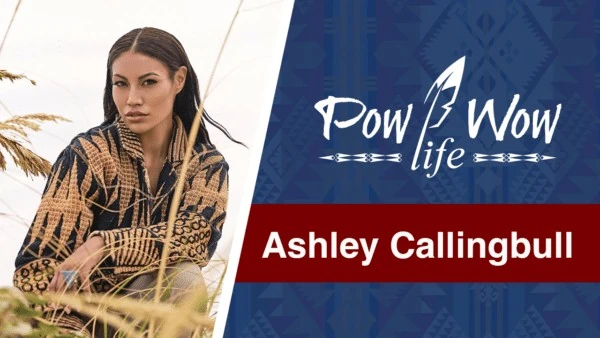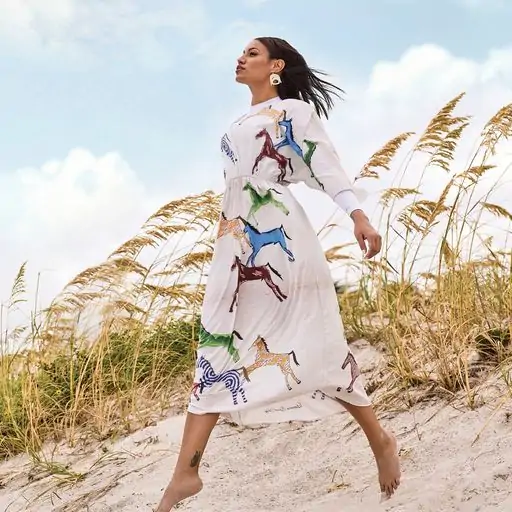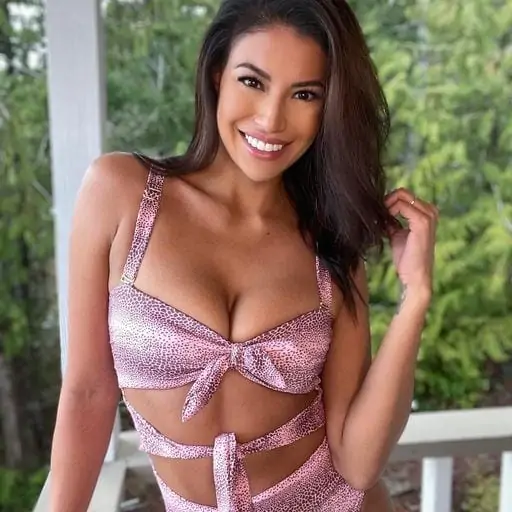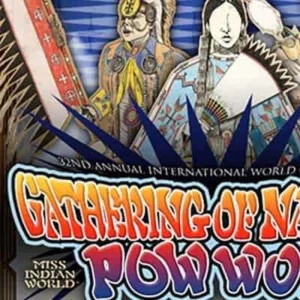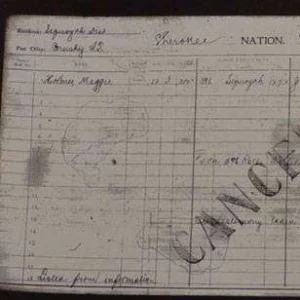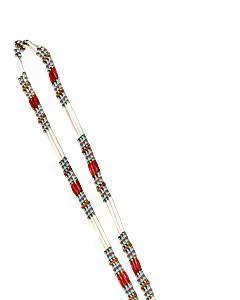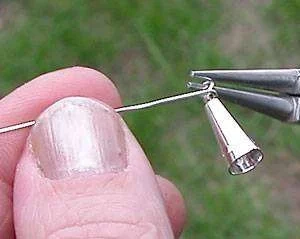Join Paul G for an interview with Ashley Callingbull.
About Ashley Callingbull
Ashley Callingbull is a Cree First Nations woman from the Enoch Cree Nation in the province of Alberta, Canada.
She is very devoted to her culture and people, takes pride in her Native Cree heritage, and has shown this through her volunteer work with community Elders and youth. Ashley is an actress, model, jingle dress dancer, and First Nation activist who was Mrs. Universe 2015, an actress on the Gemini award-winning series Blackstone, CBC's 8th Fire Series, Catch The Dream series, Tribal, and a contestant on the Amazing Race Canada.
Ashley is also an international motivational speaker and role model for many educational institutions, workshops, conferences, and award ceremonies. Ashley has spoken at Harvard University, TED Talks, and WE Day. Ashley’s hard work and charity work were recognized as she received the Role Model Award from the Dreamcatcher Foundation and also received the Top 20 Under 30 Award in Canada. Ashley was named one of Canada’s Top 10 Power Women by Optimyz Women’s Wellness. Ashley received the Youth First Nations award from the Indspire Awards which represents the highest honor the Indigenous community awards its people.
Ashley was also the youngest woman inducted into the Circle of Honour at the Esquao Awards, which recognizes Indigenous female Leaders and Activists. Ashley also received a role model award from the United Nations for Global Dignity Day. Ashley has graced the magazine covers of Fashion, Chatelaine, OptiMYz, Dress to Kill, Edify, and Kind Magazine, and has written for Flare Magazine. Ashley is also a spokesperson and model for Hillberg & Berk, RW&Co, Innisfree by Sephora, Dress For Success, Nintendo, Hello Fresh, and Nike.
Ashley was recently selected to be the first indigenous model in the Sports Illustrated Swimsuit Issue.
Follow Ashley Callingbull
Transcript
Paul Gowder Interviewing Ashley Callingbull
Paul Gowder: Thanks so much for being here. I'm really excited to be able to interview you and spend a few minutes getting to know you a little bit better. You don't need an introduction, but if you would for anybody out there who hasn't seen you out there on social media, would you mind introducing yourself and tell us where you're from?
Ashley Callingbull: My name is Ashley Callingbull. I'm from Enoch Cree Nation, which is in Treaty six territory. I'm an actress model and motivational speaker.
Paul Gowder: Thank you. Now, over the years, you know, I've followed you for a few years now, powers like Khan, we've covered some of the things you've done, the latest being pretty exciting, first indigenous woman to be in the swimsuit issue.
So let's talk about that first. How did that come about?
Ashley Callingbull: Well, basically, I applied. You know, I applied and you know, it was something I always wanted to do. But every year, I was already doing something. And this is the one year where I'm like, you know what I'm like, I'm gonna go for it. I'm like, this is it. And you know, if it's meant to be it's meant to be. And 1000s of women applied, and that's something that I didn't know. And, you know, when I got the call, I was, you know, obviously crying in bed, because it was 6am when I got the call, and I just like, I couldn't believe it. And still to this day, it's like, I'm still kind of like in shock, you know, because they've officially announced it that I'm the first like indigenous First Nations woman to ever be in the magazine. So that's just like, a pretty, I guess, momentous occasion of my life.
Paul Gowder: Yeah, super, super exciting. I think over the years, people have seen the Sports Illustrated stuff, or whether it's, you know, some of the behind-the-scenes stuff are some of the models. So what was it like to actually be on the set, and you know, seeing some of that. I'm always intrigued by the behind-the-scenes stuff as a photographer and all that.
So whenever I see that, I'm always interested in all the work that goes into that. So what was it like being there on the set?
Ashley Callingbull: It was a whirlwind, because I got there and you know, obviously, I saw all the bathing suits. And it wasn't like a typical modeling job. Usually, when you go to a modeling job, they tell you what to wear, tell you how to be and whatnot. When I got there, they were so welcoming. And they said, you know, we want you to pick anything that you want to wear. We want you to feel comfortable, we want you to feel confident, you know, what you're wearing, and how you represent yourself, like, just be the best version of yourself. And that's nice, because you don't have to change for nobody. And you know, with Sports Illustrated, they're just kind of like, want to amplify my voice. And when I got on set, it was I was like, oh my God, like this is really happening. This is what it's really like for them and so many people, because it was spring break of all times, we're doing the shoot on the beach in Dominican Republic.
And there's all these people coming on the beach, like what's going on, you know, have everything set up like a full production crew. And everyone's like trying to take pictures, security saying no photos, no one can see this. And I'm just like, the armies around and, and I'm like, what is going on? Like, this is just like, this is real, like, this is real life. And then something crazy happened because like the news came out that I was there doing the shoot, there was a couple that was from Saskatchewan.
And I knew they were from Saskatchewan, because they had Saskatchewan shirts on in the Dominican Republic. And they looked at me and they were staring at me and the wife was really staring at me. And she's like, looking at me getting closer. And I'm just standing there like my business. I'm not saying anything. And then she's like, Oh my God, you Ashley Callingbull? Well, I just saw you in the news. She's like yesterday, Sports Illustrated here. And I was like, just, but it was just like so surreal, because then I was like, okay, got my fellow Canadians here cheering me on and that felt nice. And it was just crazy. Like how big of an impact it's had and like how far we're reaching said. So it's just, it's been really surreal. Honestly, so surreal.
Paul Gowder: That's very cool. Now, over the years, you had lots of opportunities, and you've never been afraid to use your platform and to use these opportunities to really speak out on issues.
So why do you feel that has been important to you? And what are some of those causes that have caused you to kind of you know, come out and make statements?
Ashley Callingbull: Well, you know, I've lived a really hard life growing up. You know, a lot of people say, indigenous people are going through this and going through that, and you know, only certain people should speak on it. And I feel like I've lived through poverty. I've lived through abuse. I'm like a product of intergenerational trauma. But, you know, I want everyone to know that that cycle ends with me, you know, what ends here like, I'm not going to be carrying that out onto the next generation. And you know, being able to have like this platform to be able to have this voice in this reach. In my mind, I'm thinking it's so important to educate everyone anywhere in the world, it doesn't matter where you are.
Because, you know, in Canada, in the States, no indigenous people are very neglected or always put on the backburner, and I don't think people realize like, how hard we actually have it. And like, a lot of the topics I talk about are things that, you know, people have been talking about for years, but because I have such a public platform, people are finally listening, you know, and I said, it was sad that it took almost like, for a beauty queen for people to listen, you know, it took that shock and awe, you know, what I mean, but, you know, a lot of things they talked about was murdered and missing Indigenous women.
Now, it's a huge issue, not just in Canada, but in the US, you know, it's scary to be an indigenous woman in this country, because like, automatically are seen as a target. And seeing as you're less as life than valuable is some, like less than valuable, someone else's life, you know, and that's what really, that's what triggers me is that people don't see our lives have value. And another thing I talked about is I work with a lot of kids who are in care. So it's sad when kids in care tell me, you know, these are the new residential schools. And I'm like, that's terrifying. You know, our people don't even have access to clean drinking water, a lot of our people are living in third world poverty, you know, and my COCOMO always told me, the one thing that you know, I should really talk about is that, you know, the only way Mother Earth can take care of us is if we take care of her, you know, and fighting for an environment fighting for our lands, and our water, like, that's really important to carry on to the next generation.
You know, there's so many things that I've addressed, you know, throughout all these years, and things that I've done. And you know, I'm happy to say these things, and you know, but it does come with a lot of criticism, it comes with criticism from people who are really ignorant, or negative, or thinks that, you know, we are the stereotype. And that's what I'm trying to break is that I'm trying to break the stereotypes that I'm not that person, you know, don't judge a book by its cover. And I'm just like an indigenous woman really trying to thrive and like break glass ceilings. But most importantly, I'm trying to, you know, push that glass aside. So other indigenous people can walk through and be in these spaces as well. So for me, everything that I do, I know that it has a ripple effect. And it's up to me if I want it to be positive or not. So for me, I always think about what kind of legacy I'm leaving behind and who I'm going to be uplifting along the way. I'm sorry.
Paul Gowder: I love the ripple effect analogy too. And I think that is something that when you do have like you said, it's sad that it took you to hit a status of stardom, or whatever, before people listen to you. Because it's not that the message has not been said before. It's now that somebody in your position is here is saying it so people listening, it's unfortunate. But I'm glad that you were able to take that opportunity and really seize on it. I've heard you speak to a book about you know, you, you did have a tough upbringing. And it was hard to find your identity and to you know, find yourself as a native woman.
So can you speak to that a little bit and how you have been able to really come into your own that way?
Ashley Callingbull: You know, growing up, I lived with my grandparents and my single mother. You know, I grew up, we grew up very traditional, very spiritual like my grandparents were in medicine and medicine woman, and it wasn't until you know, me and my mom, we moved away. And that's when the situation happened, where you know, we were living in abuse and living through poverty. And that really messed with my mental health and my self-esteem, how I felt about myself. Because, you know, my abuser, his parents were abused in residential school. And then he was abused, and what do you learn from them? They passed on to me. And, you know, I really, I took that hard, because, you know, my abuser told me that no one's ever gonna love me, no one's ever going to think that I'm worthy of anything.
Like, no one's ever going to care what I have to say. And when you hear things like that over and over, like you, you believe it. It really messes with you. And for years, this is something that I endured. And it wasn't until we escaped, that we went back to the reserves that I'm originally from just Enoch. And, you know, my cook mom was telling me that the one way that I can, like really heal myself is, you know, I really do need to stay on the Red Road, I need to stay away from drugs and alcohol because you know, she's a residential school survivor as along with my motion. And she told me, you know, putting those negative toxins into your body, it just like gets your spirit further and further disconnected away from you.
And she told me, that's how you get lost. And you know, that's how you make bad decisions. And that's how you end up on the wrong path. And you know, I didn't want to be like a stereotype like everyone else, you know, I felt like I didn't want to prove to my abuser and everyone around me that they were wrong. I wanted to prove to myself so that, you know, I am worthwhile, that I can do things and that, you know, I should love myself. And, honestly, you know, going through all the things that I went through and having to go to court and go to therapists.
Going to therapy never worked for me, I realized that my therapy was actually at home in the sweat lodge and ceremonies. And my cook, she told me that she said, you know, your healing is here, you know, our cultures are strength, you know, resiliency runs in our blood. And she told me that my culture will always be there for me, she said, I can go into sweat, cry, pray, do whatever I need to do. But she said that I need to let go of the pain in the past, let go of things that I can't control. And you know, once I did that, I realized that I can't let those things control my future. So, you know, it's something that unfortunately happens to me, but I've learned and grown from it.
And I thought what can I do to, you know, focus on what's best for me and all my happiness and, you know, pushing myself into my culture that saving my life, staying on the Red Road, it helped me find myself and it really made me realize that, you know, I am strong, you know, my culture is what makes me beautiful, and it gives me strength.
And, you know, I feel like now, I have no limits, I feel like I'm a woman who's like, on a mission you know. I went from being this little insecure girl that had no dreams to being this young woman that's like doing so much and like, I'm trying to open the door for other young women who may be going through the same things and the same feelings that I went through. So it's almost like, my life is coming full circle now, because I'm working with a lot of girls who are like, the younger version of myself. So it's honestly, it's like, truly remarkable to see the change that I can create if I stay on the right path and you know, encourage others as well. So my culture has 100% saved my life.
Paul Gowder: Yeah. What would you have to say about therapy, traditional therapy may not work for everybody? And so you're finding it back and you're tuning into your culture, that's basketball. So it really go back home and that's where it is.
And I'm always fascinated to hear you know, how people the path that people took to get here, you know, growing up in Canada and coming off the reserve, what inspired you to get involved in pageants? How did that happen?
Ashley Callingbull: I actually was never going to. You know, like, a lot of people were encouraging me, and I'm like, it's not really my thing. You know, I was just like a typical res girl in a science fair geek, like it was not in the stars for me, not something I ever imagined. And I literally just watched Miss Congeniality. But my friend, she actually encouraged me, she said, you know, a lot of girls and this was back in the day, are doing pageants really for self-gain, you know, just to like, move forward in their career.
She said, there's no girls that are using pageants in a way that you're, you know, doing the work that you're doing. And when I was 14, after my sister passed, like, I realized my path was like to, really for me to heal myself, if that makes sense. Like my cook, I'm always said it was a healing journey, like everything that I've gone through. And she said, in order to, like, help heal yourself, like, it's important to help others heal as well. So after my sister passed, I started volunteering at the hospital she was cared for at, and I kind of like, wouldn't leave, I was like, always. And I realized that like being around people, and creating connections, and working with people was really like, it was really good for me, but it was good for others too. And then I just started volunteering, all these different organizations that have like, personally affected me in some way, like, you know, the Cancer Association, because my mom, she's a two time cancer survivor.
And then Pulmonary Fibrosis Foundation, you know, the Lung Association, these are things I like, affected my family. And then I realized, you know, the people that suffer the most in our country are our own people. So that's when I started really like going hard and working with a lot of indigenous years. And my friends said, why don't you use all this work that you're doing and like, amplify it on a larger scale? Because, you know, no one else is doing that, you know, you go to this pageant, and you can win money, you get sponsors, like you're raising money, whatever you want to do for yourself. And I thought, like, well, why not? Instead of like getting there, because you know, when you're an ambassador or role model, like it's always bigger than you, like, there's so many eyes on you. And it's not just about like, self-gain.
For me, I'm like, well, who am I going to amplify? Who am I going to help because as an ambassador, and as a leader, like you want someone that is respectable and relatable, and someone that's like actually doing the work. And for me, I thought, well, this is a perfect position to you know, raise funds and awareness for all the charities that I've been volunteering for and doing, you know, all these things. I'm like, this is like a perfect combination, instead of just going being like, Hey, I'm Ashley. And then I know going home, you know, it was about like, no, hi, like, I'm Ashley. I'm like, this is what I stand for. This is what I believe in. Would you like to help? I'm like, these are the people that really need help. So, for me, it was about like, bringing a lot of people along with me. And then once I got into that world, it was just like a completely different world I was not prepared for and now that I know the world, I'm in the pageant world anyways, I'm able to help other women, you know, get comfortable in those spaces. So it's been quite the transition.
Paul Gowder: And I imagine there isn't a lot of indigenous or First Nation, people really participating in pageants, especially, you know, when you first got started, so what was the reaction with the other contestants?
You know how did that all work out?
Ashley Callingbull: That's been very good for me. You know, the first pageant I joined, I experienced a lot of discrimination from girls, and also from the media, it was extremely tough for me, because, you know, I'm joining this world, and I didn't know how to get sponsors, I didn't know how to go about it. So I literally brought my own regalia I had indigenous designers like helped me and whatnot. And everyone can see that, you know, I was proudly like indigenous plains create. And when I got there, you know, right away the comments start with you know, you don't belong here, you don't fit in, blah, blah, blah.
And I'm like, well, I'm just here being the best version of myself. You can either accept it or, or whatever. I'm like, it's not going to faze me. But it was when I was feeling really good. I was feeling really positive. And I thought, you know, I'm the only indigenous woman here like, this is just remarkable, right. Like, it's kind of crazy. And I remember it was 2010, the media in Toronto wrote an article about me as a joke. And in 2010, this was okay, but now this would not be okay. Like, it was never okay to be printed but they wrote a joke about me.
They said, there's an indigenous woman competing this year, I wonder what she's going to do for a talent. She's going to chug Lysol or sign welfare checks with her toes. And reading that in the paper and my name next to it and was like, you know, like, how dare they? How could they? I'm like, it's so ignorant, racist. Like, it was upsetting. And it like, hurt. Because, like, how you know, like that's so hurtful. And right away, the media reached out all different media outlets are like, how mad are you, Ashley, tell us how mad you are. And they wanted like that angry Indian response. And that's not what I was gonna give them. You know, I said, you know, I feel bad for this person. I was like, they're so uneducated and so ignorant have honestly no idea what they're talking about.
Like if they want to get to know me as like, they can come to the show on Saturday and see what I'm all about. And then that Saturday, the craziest thing happened you know. I was standing there in the top five, and I was wearing her native designers like evening gown. So I'm standing in top five, I look to my right, the four other girls are wearing beautiful ball gowns, and they all kinda looked at me. And I remember thinking like, you know, don't doubt yourself, like you belong here. Because I was looked at, like, I didn't belong. I mean, I stuck out like a sore thumb. And I knew it was going to be hard, because everyone was making fun of me for that article. And everyone like, was like, that's who she is, you know, and that sucked. And you know, my mom was the only one who could afford to come to the show. So I just had the one fan, and I didn't know where I'm standing in the top five, and they asked, Who do you want to win? And I started hearing my name.
And then the craziest thing was, I'm so emotional thinking about it, because it was like, something I'll honestly never forget. And I was standing on stage. And I thought I was going crazy, because I started hearing drums. And I was like, what? And then I started hearing women like singing and I was like, I think I'm gonna faint. I must be going crazy. And it was just so bright. I couldn't see finally like the lights came down a little bit. And I saw so many natives that came. And after the show, they all came up to me and they relate. We saw that article, we came from all different reserves from around Toronto to come and support you to lake we want you to know that you're never alone. Your people are always there for you and I was that's something I never forgot.
Something I'll never forget is that you know, my people are always there for me. They're always like, got my back. And you know that night I became like the first indigenous woman to like be picked as Miss Canada to go on represent, like around the world, and that was in my people were there. So it got me all cry in here, Jesus.
Paul Gowder: What an awesome story, that's amazing. So amazing. I love hearing that. So as you were coming up to the pageants and stuff, I mean, who were you looking to, or did you have role models at that point? I mean, you were kind of trendsetting setting there?
Ashley Callingbull: So for me, like I used to watch Miss Universe and whatnot when I was a kid and watch it online, and like I obviously I like idolized, like Miss Venezuela, the Philippines, like, you know, those are girls that I really liked. And you know, girls that kind of look similar to myself, but there was no girls that were like me.
So, you know, coming into the pageant system, and being the only one it was really hard. But you know, my first pageant, the one I was just talking about, I actually went to perform a song and like, I was going to sing, I sang my mushrooms around that song. And then I asked, actually reached out to Buffy Sainte Marie, and after everything that was happening, and I asked her if I could save her song, and you know, because she was a huge idol of mine, like still is, I thought, like, she's someone like, I want to, like, be like, you know, I don't ever think I'll be like Buffy, no sing and whatnot. But, you know, just everything that she carries and everything that she stands for, and how powerful she is.
That is what I that is what I really respect. And when I reached out to her, you know, I said, can I you know, everything that I was going through at the time, and, you know, I never thought she would reach out back to me, but she did. And she told me, you know, how proud she was and how amazing it is. And she gave me all these words of encouragement. And that's honestly like what I needed. And it just, like, lit a fire under my ass. And I was like, oh my god, like Buffy. Like my heroes, she's told me to go kick some ass. Like, and she's the most badass chick ever. I don't know if not to say the word.
Paul Gowder: It's okay.
Ashley Callingbull: Okay. But that, like, that's how I know now like, what type of impact you can have on like, another woman like empowering another woman. So when I'm working with like, these girls now, when I reach out, and they say things back, like, Oh, my God, I can't believe you responded, or I can't believe like, you're actually taking the time on. Like, that's how I felt with Buffy. You know, that's, I was just like, Oh, my God, like, start star struck and like, so happy and so thankful. So now I'm in this position where I can, like, help other women and you know, help them be in this space and get them ready.
So it's just like, it's amazing what words of encouragement it can do, especially like from people that you really idolized. And Buffy was not in the pageant world, but she was someone I really idolized. And she was in like, you know, mainstream has been on the public stage you know. So for me, having her support, like really helped me a lot. And it made me realize, you know, this is a space that I belong in.
Paul Gowder: Love that. You know, I've talked to a lot of people that, like you did, as they were coming up to you, or kind of setting your own direction. And there were just a handful of people when, you know, Buffy or other people that you could find in mainstream areas. But now we have people like you in pageants and amazing race. And now Sports Illustrated, and now we've got TV shows with actual indigenous people in indigenous roles, which is just mind blowing. So, you know, representation does matter. And I can't imagine what we're going to see 10 years from now, because of all the representation like, you know, like you guys that are really out there for young women and young men to kind of see a path.
So what is it that you would like to say to those young women out there that are looking to you, as that role model? What's your message to them?
Ashley Callingbull: Well, you know, coming, I was in the same place that they were, I realized that over time, I needed to love and appreciate myself for the way that I was created, you know, because Creator made me this way for a reason. And I also needed to realize I should never set limits for myself, you should always have this mentality of like, why not? Well, why can't I know? The only person that's stopping you is you. So for me, the lifestyle that I live now is that I love myself, and I live fearlessly I'd never let fear stop me from chasing my dreams, no matter how big or small or what anyone says. I'm like, if it feels right in my heart, like you're on the right path.
So for me, it's all about empowering the next generation as well. You know, I want to tell the youth or whoever is listening is that the one thing I learned from my grandmother was that you're a role model whether you know it or not, there's always someone watching you. And it doesn't matter who there is always someone watching you and thinking you know, like how what they're doing. Maybe I can do it too you know. So that representation goes so far? That's why it's so important.
Paul Gowder: Yeah, you never know who's watching, you never know how that's gonna affect. And like you said earlier, you never know what those ripples are going to be from that one Instagram message or whatever it is that you do. That's awesome. All right. So, Sports Illustrated, I mean, you've done all this stuff.
What's next now? What’s your next project? Where are we gonna see you now?
Ashley Callingbull: Oh my goodness, there's a lot going on that I'm legally not allowed to say. But I am legally allowed to say, I do have a jewelry collection coming out to one is coming out in June for indigenous history month. And the funds will be going back to Indigenous women and programs with the native Women's Association of Canada. So that's exciting. And then I have the official Ashley Callingbull Jewelry collection, or I can't wait for you guys to see it. I've incorporated with an all indigenous team, all indigenous designers like clothing, everything. So it's just gonna, like, basically scream like pride, I think for me, and yeah, that's coming out in September. And again, like the funds that we're raising is going back to Indigenous women's programs in Canada, which is amazing. And I'm actually working on my first book, I just signed a book deal with HarperCollins publishing.
And that's like, really major, I didn't realize how major that was. But that will be coming out in fall 2023. And it's basically like a memoir of my life and all the things that people don't know. And all the struggles, you know, because people do judge a book by its cover. A lot of people will look at me now and say, like, Oh, she probably got everything easily handed to her. And I'm like, No, I've been hustling for years. You know, a lot of people think the success and the things they have now they're like, Oh, that was easy. I'm like, No, I've been doing this for a long time. But I'm also doing a posting things. I can't say what the TV show is yet. But eventually I can say, and you will see me in sports on the television for the CFL. That's all I can say. Yeah, geez, there's so many things that I'm doing like, obviously Sports Illustrated this summer.
That will be coming out, they will be announcing who the rookie is on August 1st. So pray it's me that I get the cover, you know, that will be like history in the making as well. There's actually a lot of things that I'm doing, even like all my keynotes and things that I do with women and whatnot. So my life is pretty JAM PACKED till next year. But you know, I'm excited. And I'm also coaching girls right now for pageants on the side, which is pretty fun. It's not something that I get paid to do. It's just something that I'm like doing, you know, because like I was saying before in our talk I've never had anyone that helped me. So now I'm now I'm that person like helping other girls. So my life is a jam packed busy. I can't legally say a lot of things unfortunately.
Paul Gowder: Understand.
Ashley Callingbull: When I can, they'll announce it first.
Paul Gowder: I know NDAs are rough to work around.
Ashley Callingbull: Oh, that’s my job.
Paul Gowder: Yeah, I got it. Alright, one final question. Who are you wearing today? I love the pattern.
Ashley Callingbull: Oh, she's a Cree designer, like a full on dress. And these are her earrings as well that she made. I love reppin native designers, there's so much talent in Indian country that you don't even see. And it's just in seeing some of our people now they're going to be a New York Fashion Week. And I'm going to be modeling in New York Fashion Week for some of these designers. So it's just, that's something I'm really looking forward to, like indigenous fashion. I gotta love it.
Paul Gowder: It's all in it to see it hit mainstream. I loved it. I don't know if you watch Rutherford falls on peacock but to see them putting in some of the clothing beadwork and everything. It was also cool to see all that hit mainstream and it's gonna be fun now that they're hitting some of the fashion too. Its things really going to take off. We're going to see it all over the place now.
Ashley Callingbull: Ranging but finally, finally, you know, and it really amazes me I'm like, I wonder what things will look like in 10 years you know, it's never know anything is possible.
Paul Gowder: Yeah. I mean, the summer we're gonna have young girls seeing you in Sports Illustrated and seeing now that wow, that's possible. I can do that. So it's fantastic. Well, thank you for spending a few minutes with me. I can't wait to follow along as your jewelry comes out and everything else is going to be great. Thank you so much.
Ashley Callingbull: Thank you so much for having me. Appreciate it.
Last Updated on January 10, 2024 by Paul G
